2016年南师大翻译硕士参考书
2016年南京师范大学翻译硕士(MTI)汉语写作与百科知识真题试卷.doc

2016年南京师范大学翻译硕士(MTI)汉语写作与百科知识真题试卷(总分:16.00,做题时间:90分钟)一、名词解释(总题数:6,分数:12.00)1.中国将致力于在未来5年使中国7 000多万农村贫困人口全部脱贫,将设立“南南合作援助基金”,并将继续增加对最不发达国家投资,支持发展中国家落实2030年可持续发展议程。
中国将把落实2030年可持续发展议程纳入“十三五”规划。
我倡议二十国集团成员都制定落实这一议程的国别方案,汇总形成二十国集团整体行动计划,助推世界经济强劲、可持续、平衡增长。
(分数:2.00)__________________________________________________________________________________________ 2.我希望,两岸双方共同努力,两岸同胞携手奋斗,坚持“九二共识”,巩固共同政治基础,坚定走和平发展道路,保持两岸关系发展正确方向,深化两岸交流合作,增进两岸同胞福祉,共谋中华民族伟大复兴,让两岸同胞共享民族复兴的伟大荣耀。
(分数:2.00)__________________________________________________________________________________________ 3.长期以来,我国广大科技工作者包括医学研究人员默默耕耘、无私奉献、团结协作、勇攀高峰,取得许多高水平成果。
屠呦呦获得诺贝尔生理学或医学奖,是中国科技繁荣进步的体现,是中医药对人类健康事业做出巨大贡献的体现,充分展现了我国综合国力和国际影响力的不断提升。
希望广大科研人员认真实施创新驱动发展战略,积极推进大众创业、万众创新,瞄准科技前沿,奋力攻克难题,为推动我国经济社会发展和加快创新型国家建设做出新的更大贡献。
(分数:2.00)__________________________________________________________________________________________ 4.我非常高兴地向本次联合国成立70周年纪念活动致以最热烈的祝贺。
南京师范大学考研各专业参考书目汇总-南师大各专业考研指定教材是什么?-南师大考研参考书目如何获得?
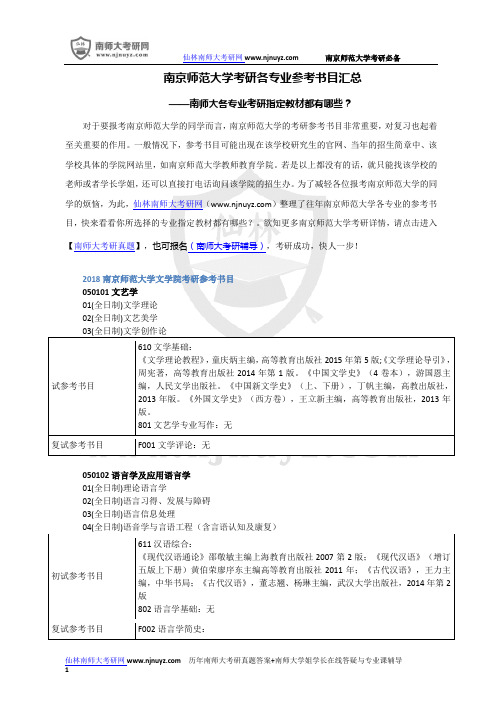
南京师范大学考研各专业参考书目汇总——南师大各专业考研指定教材都有哪些?对于要报考南京师范大学的同学而言,南京师范大学的考研参考书目非常重要,对复习也起着至关重要的作用。
一般情况下,参考书目可能出现在该学校研究生的官网、当年的招生简章中、该学校具体的学院网站里,如南京师范大学教师教育学院。
若是以上都没有的话,就只能找该学校的老师或者学长学姐,还可以直接打电话询问该学院的招生办。
为了减轻各位报考南京师范大学的同学的烦恼,为此,仙林南师大考研网( )整理了往年南京师范大学各专业的参考书目,快来看看你所选择的专业指定教材都有哪些?。
欲知更多南京师范大学考研详情,请点击进入【南师大考研真题】,也可报名(南师大考研辅导),考研成功,快人一步!2018南京师范大学文学院考研参考书目050101文艺学01(全日制)文学理论02(全日制)文艺美学 试参考书目 610文学基础:《文学理论教程》,童庆炳主编,高等教育出版社2015年第5版;《文学理论导引》,周宪著,高等教育出版社2014年第1版。
《中国文学史》(4卷本),游国恩主编,人民文学出版社。
《中国新文学史》(上、下册),丁帆主编,高教出版社,2013年版。
《外国文学史》(西方卷),王立新主编,高等教育出版社,2013年版。
801文艺学专业写作:无复试参考书目F001文学评论:无050102语言学及应用语言学01(全日制)理论语言学02(全日制)语言习得、发展与障碍03(全日制)语言信息处理050103汉语言文字学01(全日制)古代汉语初试参考书目 611汉语综合:《现代汉语通论》邵敬敏主编上海教育出版社2007第2版;《现代汉语》(增订五版上下册)黄伯荣廖序东主编高等教育出版社2011年;《古代汉语》,王力主编,中华书局;《古代汉语》,董志翘、杨琳主编,武汉大学出版社,2014年第2版803语言学概论:《语言学纲要》,叶蜚声、徐通锵著,北京大学出版社,1997年第3版。
南京师范大学-翻译硕士MTI-培养方案
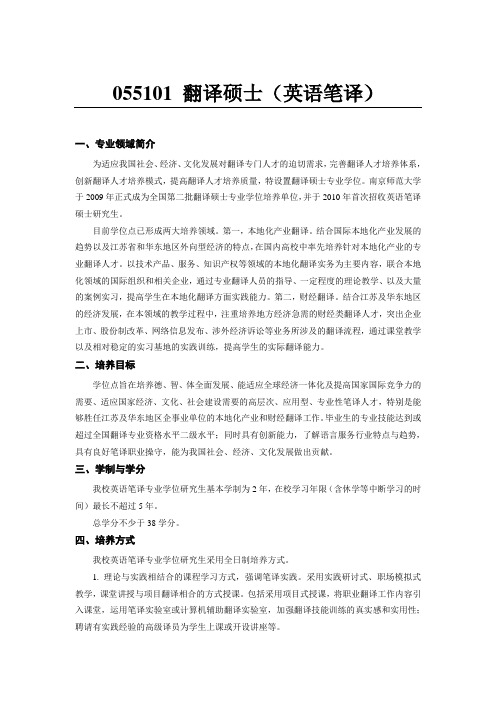
055101 翻译硕士(英语笔译)一、专业领域简介为适应我国社会、经济、文化发展对翻译专门人才的迫切需求,完善翻译人才培养体系,创新翻译人才培养模式,提高翻译人才培养质量,特设置翻译硕士专业学位。
南京师范大学于2009年正式成为全国第二批翻译硕士专业学位培养单位,并于2010年首次招收英语笔译硕士研究生。
目前学位点已形成两大培养领域。
第一,本地化产业翻译。
结合国际本地化产业发展的趋势以及江苏省和华东地区外向型经济的特点,在国内高校中率先培养针对本地化产业的专业翻译人才。
以技术产品、服务、知识产权等领域的本地化翻译实务为主要内容,联合本地化领域的国际组织和相关企业,通过专业翻译人员的指导、一定程度的理论教学、以及大量的案例实习,提高学生在本地化翻译方面实践能力。
第二,财经翻译。
结合江苏及华东地区的经济发展,在本领域的教学过程中,注重培养地方经济急需的财经类翻译人才,突出企业上市、股份制改革、网络信息发布、涉外经济诉讼等业务所涉及的翻译流程,通过课堂教学以及相对稳定的实习基地的实践训练,提高学生的实际翻译能力。
二、培养目标学位点旨在培养德、智、体全面发展、能适应全球经济一体化及提高国家国际竞争力的需要、适应国家经济、文化、社会建设需要的高层次、应用型、专业性笔译人才,特别是能够胜任江苏及华东地区企事业单位的本地化产业和财经翻译工作。
毕业生的专业技能达到或超过全国翻译专业资格水平二级水平;同时具有创新能力,了解语言服务行业特点与趋势,具有良好笔译职业操守,能为我国社会、经济、文化发展做出贡献。
三、学制与学分我校英语笔译专业学位研究生基本学制为2年,在校学习年限(含休学等中断学习的时间)最长不超过5年。
总学分不少于38学分。
四、培养方式我校英语笔译专业学位研究生采用全日制培养方式。
1. 理论与实践相结合的课程学习方式,强调笔译实践。
采用实践研讨式、职场模拟式教学,课堂讲授与项目翻译相合的方式授课。
包括采用项目式授课,将职业翻译工作内容引入课堂,运用笔译实验室或计算机辅助翻译实验室,加强翻译技能训练的真实感和实用性;聘请有实践经验的高级译员为学生上课或开设讲座等。
南京师范大学汉硕参考书、院校分析
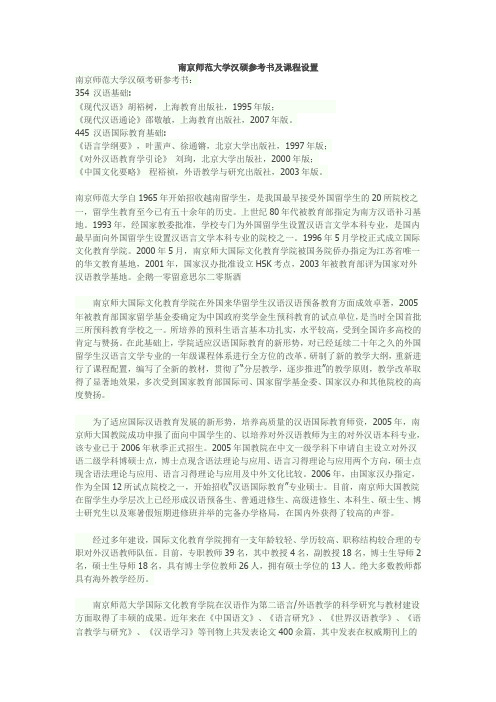
南京师范大学汉硕参考书及课程设置南京师范大学汉硕考研参考书:354 汉语基础:《现代汉语》胡裕树,上海教育出版社,1995年版;《现代汉语通论》邵敬敏,上海教育出版社,2007年版。
445 汉语国际教育基础:《语言学纲要》,叶蜚声、徐通锵,北京大学出版社,1997年版;《对外汉语教育学引论》刘珣,北京大学出版社,2000年版;《中国文化要略》程裕祯,外语教学与研究出版社,2003年版。
南京师范大学自1965年开始招收越南留学生,是我国最早接受外国留学生的20所院校之一,留学生教育至今已有五十余年的历史。
上世纪80年代被教育部指定为南方汉语补习基地。
1993年,经国家教委批准,学校专门为外国留学生设置汉语言文学本科专业,是国内最早面向外国留学生设置汉语言文学本科专业的院校之一。
1996年5月学校正式成立国际文化教育学院。
2000年5月,南京师大国际文化教育学院被国务院侨办指定为江苏省唯一的华文教育基地,2001年,国家汉办批准设立HSK考点,2003年被教育部评为国家对外汉语教学基地。
企鹅一零留意思尔二零斯酒南京师大国际文化教育学院在外国来华留学生汉语汉语预备教育方面成效卓著,2005年被教育部国家留学基金委确定为中国政府奖学金生预科教育的试点单位,是当时全国首批三所预科教育学校之一。
所培养的预科生语言基本功扎实,水平较高,受到全国许多高校的肯定与赞扬。
在此基础上,学院适应汉语国际教育的新形势,对已经延续二十年之久的外国留学生汉语言文学专业的一年级课程体系进行全方位的改革。
研制了新的教学大纲,重新进行了课程配置,编写了全新的教材,贯彻了“分层教学,逐步推进”的教学原则,教学改革取得了显著地效果,多次受到国家教育部国际司、国家留学基金委、国家汉办和其他院校的高度赞扬。
为了适应国际汉语教育发展的新形势,培养高质量的汉语国际教育师资,2005年,南京师大国教院成功申报了面向中国学生的、以培养对外汉语教师为主的对外汉语本科专业,该专业已于2006年秋季正式招生。
南师大 英语专业 推荐书目

经贸英语专业:大一10级01&02班1.《读者的选择》作者:桑德拉. 西尔伯斯坦等出版社:世界图书出版2.《美国文化与社会》作者:王恩铭出版社:上海外语教育出版社3.《聚焦雅思:突破读写技能》作者:奥.沙利文等4.《现代大学英语精读课文辅导1》作者:单小明出版社:世界图书出版公司5.《Pride and Prejudice》作者:Jane Austen 出版社:Bantam Books ,19816.《Jane Eyre》作者:Charlotte Bronte 出版社:Toronto: Bantam Books ,19817.《Robinson Crusoe》作者:Daniel Defoe 出版社:New Jersey: Watermill Press, c19808.《David Copperfield》作者:Charles Dickens 出版社:Bantam Books, 19819.《Tess of the D’Urbervilles》作者:Thomas Hardy 出版社:London : Macmillan London Ltd, c197510.《The Great Gatsby》作者F. Scott Fitzgerald 出版社:Bantam, 197411.《The Old Man and the Sea》作者:Ernest Hemingway 出版社:Scribner ,195212.《The Call of the Wild》作者:Jack London 出版社:Bantam Books ,198113.《Sunshine Sketches of a Little Town》作者:Stephen Leacock 出版社:Broadview Pr14.《Anne of Green Gables》作者:L. M. Montgomer 出版社:Reader's Digest Association c199215.《Reader’s digest》(读者文摘)16.《英语世界》出版社:商务印书馆大二 09级01&10&11班1.实用商务英语阅读作者:蔡蔚,彭春萍出版社:北京理工大学出版社,2010.2.当代商务英语阅读教程作者:井升华出版社:华东师范大学出版社,2007.3.商务英语阅读教程作者:李明斐出版社:大连理工大学出版社,2005.4.商务英语阅读-高等学校英语拓展系列教程作者:李小飞,祝凤英出版社:外语教学与研究出版社,2005.5.商务英语阅读作者:王艳出版社:对外经济贸易大学出版社,2008.6.商务英语阅读教程作者:王元歌,刘辉出版社:北京大学出版社,2007.7.商务英语阅读作者:王晓光,林伟出版社:华东理工大学出版社,2009.8.商务英语阅读作者:谢文怡出版社:上海交通大学出版社,2009.9.世纪商务英语阅读教程(第四版)作者:王洗薇,任奎艳出版社:大连理工大学出版社,2009.10. Selected Readings in Business 作者:Myra Ann Shulman 出版社:Millennium Edition, University of Michigan Press, 2003.大三08级01&13&14班1.The Joy Luck Club 作者:Amy Tan 出版社:Ivy Books, 1989.2.Adventures of Huckleberry Finn (Tom Sawyer's comrade) ,作者:MarkTwain 出版社:Charles L. Webster and Company , 1885.3.Norton Anthology of English Literature.ed. 作者:M. H. Abrams and Stephen Greenblatt. 出版社:New York: W. W. Norton & Company, Inc.4.Liberty and Utilitarianism 作者:John Stuart Million5.the Republic 作者:Plato6.Wealth of Nations 作者:John Smith7.《难以忽视的真相》: the planetary emergency of global warming and what we can do about it (美) , 作者:阿尔·戈尔出版社:湖南科学技术出版社 2007.8.《永不屈服:温斯顿·丘吉尔一生最佳演讲集》:the best of Winston Churchill's speeches 作者:(英) 温斯顿·S. 丘吉尔9.《美国文明》作者:钱满素出版社:中国社会科学出版社, 200110.《剑桥文学指南》(英国文学系列)外研社上海外语教研出版社,200111.《英国文学简史》作者:刘炳善出版社:河南大学出版社,199812.《英国文学论述文集》作者:李赋宁出版社:外语教学与研究出版社,199713.《英国诗文选译集》作者:王佐良出版社外语教学与研究出版社,199614.《英国文学选读》作者:王守仁出版社高等教育出版社,2004翻译英语专业:大二09级02班1.《英汉文体翻译教程》作者:陈新出版社:北京大学出版社,19992.《实用英汉汉英口译教程》作者:徐海铭,季海宏出版社:南京师范大学出版社,20043.《汉英新时代政经用语精编》作者:王义端,俞颂熙出版社:外文出版社,19994.《口笔译理论研究》作者:刘必庆出版社:中国对外翻译出版公司,20045.《英语高级口译技能训练教程》作者:陈翔出版社:华东师范大学出版社,20056.《新闻英语文体与范文评析》作者:张健出版社:上海外语教育出版社,2004年7. My Country and My People 作者:Lin Yutang 出版社:Foreign Language Teaching and Research Press, 20048. Key Concepts in Chinese Philosophy 作者:Zhang Dainian 出版社:Foreign Languages Press, 20029.The Story of Mankind 作者:Hendrik Willem Van Loon 出版社:Foreign Language Teaching and Research Press, 2000.10. 中式英语之鉴作者:Joanne Pinkham 出版社:外语教学与研究出版社11. History of Western Philosophy 作者:Bertrand Russell 出版社:Routledge12. Paths of American Thought 作者:Arthur M. Schlesinger, Jr., and Morton White 出版社:Houghton Mufflin Company13. The Story of English 作者:Robert McCrum, Robert MacNeil, and WilliamCran 出版社:Penguin14. Word Play -- What happens when people talk 作者:Peter Farb 出版社:Bantam15. Great Lives -- A Century of Obituraries Times Books16. The Yin and Yang of American Culture. 作者:Kim, E. Y. 出版社:Yarmouth, Maine: Intercultural Press, Inc.17. Encyclopedia of Contemporary Chinese Culture. 作者:Davis, E. L. ed.2005. 出版社:London & New York: Routledge.18. The Translator’s Guide to Chinglish. 作者:Pinkham, J. 2000. 出版社:Beijing: Foreign Language Teaching and Research Press.19. 《冲突·互补·共存——中西文化对比研究》作者:左飚. 出版社:2009.上海:上海外语教育出版社.20. 《母语与翻译》作者:李美. 出版社:2008.上海:上海外语教育出版社.21. 《非文学翻译理论与实践》作者:李长栓. 出版社:2004.北京:中国对外翻译出版公司.22. Listen to this系列作者:何其莘金利民出版社:外语教学与研究出版社23. Listen this way系列作者:张民伦出版社:高等教育出版社大三08级02班1.《怎样学习当好译员》作者:胡庚申出版社:中国科学技术大学出版2.《英语口译基本技能》作者:张清平出版社:对外经济贸易大学出版社3.《英汉同声传译》作者:张维为出版社:中国对外翻译出版,19994.《英语口译技巧》作者:杨恩堂,姚秀清出版社:青岛出版社5.《外事翻译:口译和笔译技巧》作者:徐亚男出版社:世界知识出版社,19986.《好易学英汉口译》作者:方凡泉出版社广州:世界图书出版公司,20007.《英语口译实战技巧与训练》作者:徐东风、陆乃圣、毛忠明出版社:大连理工大学出版社,20058.《中式英语之鉴》作者:JOAN PINKHAM 出版社:外语教学与研究出版社9.《旅游翻译与涉外导游》作者:陈刚出版社:北京:中国对外翻译出版公司,2004年10. 《涉外知识手册》作者:于丹莉11. 《英语翻译规律》作者:碧青、周丽蕊12. 《口译技巧》作者:孙慧双13. 《经贸口译教程》作者:王学文14. The Cambridge Companion to Modern Chinese Culture 作者:Kam 出版社:Cambridge University Press)15. China: Its History and Culture 作者:Scott Morton, Charlton M. Lewis, and Charlton Lewis (McGraw-Hill)16. Thinking through Confucius 作者:David Hall & Roger Ames 出版社:State University of New York Press17. Daoism and Chinese Culture 作者:Livia Kohn 出版社:Three Pines Press18. The Importance of Living 作者:Lin Yutan 出版社:外语教学与研究出版社19. 《中国文化史》(上下卷)作者:柳诒徽出版社:上海古籍出版社20. 《鲁迅全集》人民文学出版社21. 《中国(古代、近代、现代)思想史论》作者:李泽厚出版社:三联书店22. 《中国文化概论》作者:张岱年、方客立出版社:北京师范大学出版社23. 《逝去的年代——中国自由知识分子的命运》作者:谢泳著出版社:文化艺术出版社师范英语专业:大二 09级03&04班1.《傲慢与偏见》作者:简奥斯汀出版社:译林出版社3.《简爱》作者:勃朗特出版社:译林出版社4.《小王子》作者:安东·圣埃克苏佩里出版社:中国青年出版社5.《课程原理:课程的理论、基础与问题》作者:施良方出版社:教育科学出版社6.《双城记》作者:狄更斯出版社:外语教学与研究出版社7.《生命中不能承受之轻》作者:米兰·昆德拉出版社:上海译文出版社8.《乞丐王子》作者:马克﹒吐温出版社:华艺出版社9.《安娜·卡列尼娜》作者:列夫·托尔斯泰出版社:中国书籍出版社10.《荆棘鸟》作者:麦卡洛出版社:译林出版社大三08级03&04班1.《外语教学与学习—理论与实践》作者:(英)马丁—韦德尔出版社:高等教育出版社2.《语言学习与语言教学的原则》作者:(英)H.D.布朗出版社:外语教学与研究出版社3.《根据原理教学:交互式语言教学》作者:(英)H.D.布朗出版社:外语教学与研究出版社4.《怎样教英语》作者:(英)杰里米.哈默出版社:外语教学与研究出版社5.《应用心理语言学---外语学习心理研究》作者:王初明出版社:湖南教育出版社6.《语言教学的基本概念》作者:H.H斯特恩出版社:上海外语教育出版社7.《语言课堂中的教与学》作者:Tricia Hedge 出版社:上海外语教育出版社8.《外语学习与教学导论》作者:(英)约翰逊(Keith Johnson)出版社:外语教学与研究出版社9.《吾国与吾民》作者:林语堂出版社:陕西师范大学出版社10.《谈谈我自己》作者:(英)拉迪亚德.吉卜林出版社:江苏教育出版社11.《全球通史—从史前史到21世纪》作者:L.S斯塔夫里阿诺斯出版社:北京大学出版社。
翻译硕士MTI参考书目
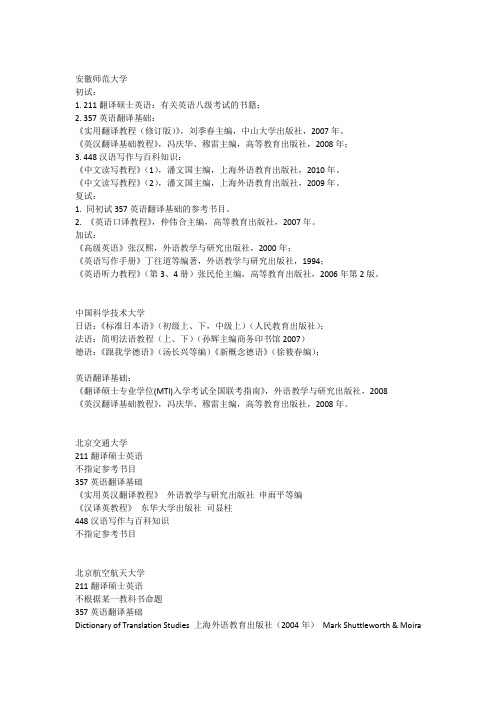
广东外语外贸大学 英语笔译、英语口译 复试参考书目 ? 991|翻译实务(笔译):1、《实用翻译教程(修订版)》,刘季春主编,中山大学出版社, 2007 年。 2、《英汉翻译基础教程》,冯庆华、穆雷主编,高等教育出版社,2008 年。 3、《英语口译教程》,仲伟合主编,高等教育出版社,2007 年。 4、《商务英语口译》(第二版),赵军峰主编,高等教育出版社,2009 年。 5、有关英语八级考试的书籍,以及英美政治、经济、文化等方面百科知识的书籍。 ? 992|面试(含口译):1、《实用翻译教程(修订版)》,刘季春主编,中山大学出版社,2007 年。 2、《英汉翻译基础教程》,冯庆华、穆雷主编,高等教育出版社,2008 年。 3、《英语口译教程》,仲伟合主编,高等教育出版社,2007 年。 4、《商务英语口译》(第二版),赵军峰主编,高等教育出版社,2009 年。 5、有关英语八级考试的书籍,以及英美政治、经济、文化等方面百科知识的书籍。
法语口译 复试参考书目 ? 993|翻译实务(笔译):1、《法语》1-4 册, 北京外国语大学法语系马晓宏等编, 外语 教学与研究出版社,1992 年。 2、《法语》5-6 册 ,束景哲主编, 上海外语教育出版社,1991 年。 3、《法语口译实务(2 级)》,陈伟, 外语出版社,2005 年。 4、《法语口译实务(3 级)》,蔡小红, 外语出版社,2005 年。 5、有关法国文学史、法国当代文化方面的书籍。 ? 994|面试(含口译):1、《法语》1-4 册, 北京外国语大学法语系马晓宏等编, 外语教 学与研究出版社,1992 年。 2、《法语》5-6 册 ,束景哲主编, 上海外语教育出版社,1991 年。 3、《法语口译实务(2 级)》,陈伟, 外语出版社,2005 年。 4、《法语口译实务(3 级)》,蔡小红, 外语出版社,2005 年。 5、有关法国文学史、法国当代文化方面的书籍。
开设翻译硕士的学校及参考书目
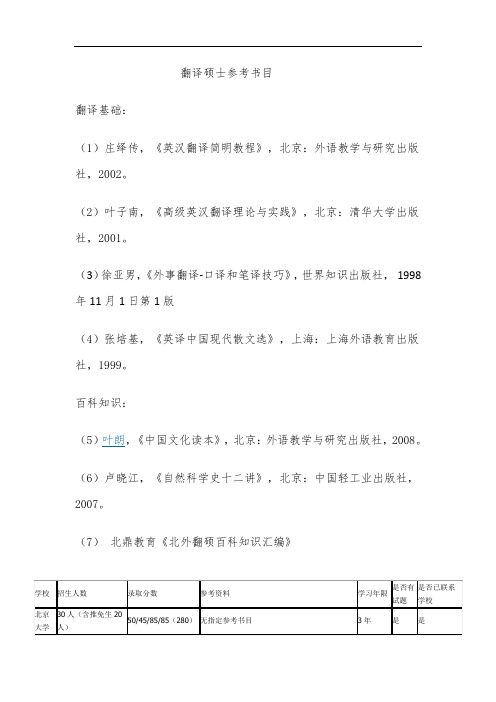
否
是 是 电话一直打 不通 是 是 是 是 是
是
是
外语 招收 50 人 外贸 大学
335/44 66 325
吉林 口译 30
大学 延边
无 大学 南京
笔译 30 人 大学
50/90/330 50 75 345/47 71 335/44 66 325 50/90/330
南京 师范 笔译 20/口译 10 大学
大学
53/80/335
中国 笔译 20 人
50 75 345/47 71
订版)》,刘季春主编,中山大学出版社,2007 年。 2、《英汉翻译基础教程》,冯庆华、穆雷主编, 高等教育出版社,2008 年。 3、《英语口译教程》,仲伟合主编,高等教育 出版社,2007 年。 4、《商务英语口译》(第二版),赵军峰主编, 高等教育出版社,2009 年。 5、有关英语八级考试的书籍,以及英美政治、 经济、文化等方面百科知识的书籍。 992|面试(含口译):1、《实用翻译教程(修订 版)》,刘季春主编,中山大学出版社,2007 年。 2、《英汉翻译基础教程》,冯庆华、穆雷主编, 高等教育出版社,2008 年。 3、《英语口译教程》,仲伟合主编,高等教育 出版社,2007 年。 4、《商务英语口译》(第二版),赵军峰主编, 高等教育出版社,2009 年。 5、有关英语八级考试的书籍,以及英美政治、 经济、文化等方面百科知识的书籍。
2. 英语翻译基础新编汉英翻译教程 上海外语
教育出版社 2004 年 4 月 陈宏薇等
大学英汉翻译教程(第三版) 对外经贸大学出
50/50/75/75(345) 版社 2009 年 8 月王恩冕
2年
3. 汉语写作与百科知识 中国文学与中国文化
2016年硕士研究生入学考试参考书目
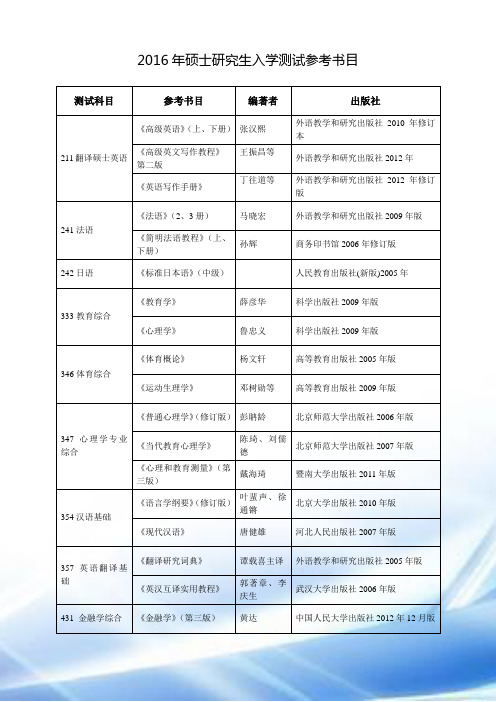
2016年硕士研究生入学测试参考书目测试科目参考书目编著者出版社211翻译硕士英语《高级英语》(上、下册)张汉熙外语教学和研究出版社2010年修订本《高级英文写作教程》第二版王振昌等外语教学和研究出版社2012年《英语写作手册》丁往道等外语教学和研究出版社2012年修订版241法语《法语》(2、3册)马晓宏外语教学和研究出版社2009年版《简明法语教程》(上、下册)孙辉商务印书馆2006年修订版242日语《标准日本语》(中级)人民教育出版社(新版)2005年333教育综合《教育学》薛彦华科学出版社2009年版《心理学》鲁忠义科学出版社2009年版346体育综合《体育概论》杨文轩高等教育出版社2005年版《运动生理学》邓树勋等高等教育出版社2009年版347心理学专业综合《普通心理学》(修订版)彭聃龄北京师范大学出版社2006年版《当代教育心理学》陈琦、刘儒德北京师范大学出版社2007年版《心理和教育测量》(第三版)戴海琦暨南大学出版社2011年版354汉语基础《语言学纲要》(修订版)叶蜚声、徐通锵北京大学出版社2010年版《现代汉语》唐健雄河北人民出版社2007年版357英语翻译基础《翻译研究词典》谭载喜主译外语教学和研究出版社2005年版《英汉互译实用教程》郭著章、李庆生武汉大学出版社2006年版431 金融学综合《金融学》(第三版)黄达中国人民大学出版社2012年12月版《公司财务》(第三版)陈雨露高等教育出版社2014年8月版445汉语国际教育基础《对外汉语教育学引论》刘珣北京语言大学出版社2000年版《汉语和汉语作为第二语言教学》吕必松北京大学出版社2007年版448汉语写作和百科知识《大学语文》王长华主编科学出版社2009年版701哲学原理《马克思主义哲学原理》(上、下)肖前中国人民大学出版社1994年1月版702法理学、宪法学《法理学》(第四版)张文显高等教育出版社、北京大学出版社2011年6月版《宪法学》(第三版)周叶中高等教育出版社、北京大学出版社2011年3月版703政治学《政治学原理》(第二版)王惠岩高等教育出版社2006年版704马克思主义原理《马克思主义哲学原理》(上、下)肖前中国人民大学出版社1994年1月版《政治经济学》(第四版)程恩富高等教育出版社2013年8月版705公共管理学《公共管理学:一种不同于传统行政学的研究途径》(第二版)陈振明中国人民大学出版社2003年版《公共管理导论》休斯中国人民大学出版社2007年版706体育专业基础综合(一)《体育概论》杨文轩高等教育出版社2005年版《体育社会学》卢元镇高等教育出版社2006年版707体育专业基础综合(二)《运动解剖学》李世昌等高等教育出版社2006年版《运动生理学》邓树勋等高等教育出版社2009年版708体育专业基础综合(三)《学校体育学》沈建华等高等教育出版社2010年版《运动生理学》邓树勋等高等教育出版社2009年版709文学基础理论《文学理论教程》(第四版)童庆炳高等教育出版社2008年版710汉语言基础(含语言学概论、现代汉语)《语言学纲要》(修订版)叶蜚声、徐通锵北京大学出版社2010年版《现代汉语》(增订五版)黄伯荣、廖序东高等教育出版社2011年版《现代汉语》唐健雄河北人民出版社2007年版711基础英语《高级英语》(上、下册)张汉熙外语教学和研究出版社修订本2010年修订本《高级英文写作教程》王振昌等外语教学和研究出版社2012年第二版《英汉翻译教程》张培基等上海外语教育出版社2009年修订本《英语写作手册》丁往道等外语教学和研究出版社2012年修订本712基础俄语《大学俄语(东方新版)》1-8册史铁强主编外语教学和研究出版社2010年第2版《现代俄语理论教程》肖连河吉林大学出版社2007年第1版713艺术理论《艺术概论》王宏建文化艺术出版社《影视艺术概论》周星高等教育出版社714和声和曲式《和声学教程》桑桐上海音乐出版社《和声学教程》斯波索宾人民音乐出版社《曲式和作品分析》吴祖强人民音乐出版社《曲式分析基础教程》高为杰、陈丹布高等教育出版社715美术专业理论(艺术概论、中外美术史)《中国美术史纲要》黄宗贤西南师范大学出版社1993年版《艺术概论》王宏建文化艺术出版社2000年版《外国美术史》中央美术学院美术史系高等教育出版社修订版外国美术史教研室编716考古学和中国古代史基础《中国大百科全书(考古卷)》中国大百科全书出版社编辑部写中国大百科全书出版社1986年版《中国考古学通论》孙英民等河南大学出版社2005年7月版《中国古代史》(上、下册)朱绍侯等福建人民出版社2010年版717数学分析《数学分析》华东师大高等教育出版社2001年第三版718科学技术哲学《自然辩证法原理》栾玉广中国科学技术大学出版社2007年版719复变函数和数理方程《数学物理方法》梁昆淼主编高等教育出版社第四版2010年720数学分析及线性代数《高等数学》(第1、2、3册)四川大学数学教研室高等教育出版社第三版2010年722物理化学《物理化学》万洪文、詹正坤主编高等教育出版社(第二版)2010年3月723地理信息系统《地理信息系统原理和实践》张军海等科学出版社2015年6月第二版726教育技术学《教育技术学》何克抗等北京师范大学出版社2009年版727中国古典文献学《中国古典文献学》张三夕华中师范大学出版社2007年版728基础日语《新编日语》修订本1-4册周平、陈小芬上海外语教育出版社2012年修订版《日语精读》1-4册宿久高、周异夫吉林大学出版社2008年第一版《新编日语语法教程》皮细庚上海外语教育出版社2011年第1版729教育专业综合《教育学基础》全国十二所重点师范大学联合编写教育科学出版社2008年版《心理学基础》全国十二所重点师范大教育科学出版社2008年第二版学联合编写《教育研究方法导论》裴娣娜安徽教育出版社1995年版730心理学专业基础综合《普通心理学》(修订版)彭聃龄北京师范大学出版社2006年版《实验心理学》(第二版)朱滢北京大学出版社2009年版《现代心理和教育统计学》张厚粲、徐建平北京师范大学出版社2009年版731世界史基础全国硕士研究生入学统一测试历史学基础测试大纲(2016年版)教育部测试中心编写《世界史》(古代史编、近代史编、现代史编)吴于廑、齐世荣高等教育出版社2011年版732中国史基础《中国古代史》(上、下)朱绍侯等福建人民出版社2010年版《中国近代史》(第四版)李侃等中华书局1994年版《中国现代史》(上、下)王桧林等高等教育出版社2010年第三版《中国历史文选》(上、下)周予同上海古籍出版社2002年7月版全国硕士研究生入学统一测试历史学基础测试大纲(2016年版)教育部测试中心733植物学《植物学》赵建成、李敏、梁建萍科学出版社734动物学《普通动物学》(第四版)刘凌云、郑光美编高等教育出版社735分子生物学《分子生物学》(第三版)朱玉贤编高等教育出版社736教育基础综合《教育学基础》(第二版)全国十二所重点师范大学联合编写教育科学出版社2008年12月版《当代教育心理学》(第二版)陈琦、刘儒德北京师范大学出版社2011年6月版737生态学《基础生态学》(第二版)牛翠娟主编高等教育出版社801西方哲学史《西方哲学简史》赵敦华北京大学出版社2001年1月版802中国哲学史《中国哲学史》(第二版)北京大学中国哲学教研北京大学出版社2003年10月版室803科学技术史《世界科学技术史》(第三版)王鸿生中国人民大学出版社2008年8月《科学的历程》(第二版)吴国盛北京大学出版社2002年10月版804民法学、刑法学《民法学》(第五版)魏振瀛高等教育出版社、北京大学出版社2013年9月版《刑法学》(第五版)高铭暄、马克昌高等教育出版社、北京大学出版社2011年8月版805当代世界经济和政治《当代世界经济和政治》(第四版)李景治、林甦中国人民大学出版社2010年7月版806马克思主义发展史《简明马克思主义史》庄福龄人民出版社2004年5月版807公共政策学《公共政策学》严强社会科学文献出版社2008年版《公共政策分析导论》邓恩中国人民大学出版社2011年版808社会保障学《社会保障概论》郑功成复旦大学出版社2007年版《社会保险》邓大松中国劳动社会保障出版社2009年版809经济学综合《政治经济学》(第四版)程恩富高等教育出版社2013年6月版《西方经济学》(第五版)高鸿业中国人民大学出版社2011年2月版810统计学基础《统计学导论》曾五一、肖红叶科学出版社2013年第二版811中国现当代文学和西方文学《中国现代文学三十年》钱理群等北京大学出版社1998年版《中国当代文学史》(上、下)(第二版)王庆生、王又平华中师范大学出版社2012年版《外国文学简编·欧美部分》(第五版)朱维之等中国人民大学出版社2004年版812古代汉语《古代汉语》(校订重排版)王力中华书局出版1999年版《古代汉语》郑振峰河北人民出版社2007年版813中国文学史《中国文学史》袁行霈高等教育出版社2005年版814综合知识(含英美文学、英语语言学)《英国文学教程》(英国卷)李正栓等科学出版社2009年版第一版《美国文学教程》(美国卷)冯梅等科学出版社2009年版第一版《语言学教程》胡壮麟、刘润清北京大学出版社2011年版第四版815俄语综合《俄罗斯文化》戴桂菊外语教学和研究出版社2010年第一版《当代俄罗斯》戴桂菊外语教学和研究出版社2008年第一版《俄罗斯文学史》任光宣等北京大学出版社2004年第一版《俄译汉教程(增修本)》蔡毅外语教学和研究出版社2010年第一版816艺术史《西方艺术简史》杨先艺主编北京大学出版社《中国艺术简史》何平、孙沙岚主编四川文艺出版社《中国电视艺术发展教程》黄会林等北京师范大学出版社817中外音乐史《中国近现代音乐史》汪毓和人民音乐出版社《中国音乐通史简编》孙继南等山东教育出版社《欧洲音乐史》张洪岛人民音乐出版社《西方音乐通史》于润洋上海音乐出版社818高等代数《高等代数》北京大学高等教育出版社2003年第三版819科学技术史《世界科学技术史》王鸿生中国人民大学出版社2008年版821量子力学《量子力学》周世勋主编高等教育出版社2005年版822普通物理(含力学、电磁学)《力学》漆安慎、杜婵英高等教育出版社2005年第二版《电磁学》赵凯华陈熙谋高等教育出版社2006年第二版824无机化学《无机化学》河北师范大学等合编高等教育出版社(上、下册)(第二版)2012年6月版825分析化学(含仪器分析)《分析化学》武汉大学主编高等教育出版社2006年2月上册第五版《分析化学》华中师大等编高等教育出版社2012年6月下册第四版826有机化学《有机化学》曾昭琼主编、东北师大等编高等教育出版社2004年7月(上、下册)第四版《基础有机化学》邢其毅等高等教育出版社2005年6月第三版827人口、资源和环境经济学《人口、资源和环境经济学》杨云彦等湖北人民出版社2011年8月第二版828地理综合《自然地理学》(第四版)伍光和高等教育出版社2008年4月版《人文地理学》(第二版)赵荣等高等教育出版社2006年5月版831数据结构《数据结构(C语言版)》严蔚敏等清华大学出版社2007年版832伦理学原理《伦理学》(修订本)罗国杰人民出版社2014年1月版《伦理学》(马克思主义理论研究和建设工程重点教材)《伦理学》编写组高等教育出版社、人民出版社2012年5月版834日语综合《日语概论》翟东娜、潘鈞高等教育出版社2008年第1版《日本文学史》张如意河北大学出版社2014年第1版《日本文学选读》傅荫北京对外经济贸易大学出版社2007年第1版《日语古典语法-基础学习和难点分析》铁军北京大学出版社2006年第1版《日本》(上、下册)大森和夫外语教学和研究出版社2009年第1版835计算机专业基础(数据结构)《数据结构(C语言版)》严蔚敏等清华大学出版社2011年版839 计算机专业基础(操作系统)《计算机操作系统》(第三版)汤小丹等西安电子科技大学出版社2007年版836生物化学《生物化学》第三版王镜岩高等教育出版社第三版837物理化学《物理化学》万洪文主编高等教育出版社838 C语言程序设计《C程序设计》第四版谭浩强清华大学出版社2010年第四版901中学思想政治(品德)教学论《思想政治学科教学新论》第二版刘强高等教育出版社2009年5月902教育管理《教育管理学》(第三版)陈孝彬、高洪源北京师范大学出版社2008年版903心理健康教育《心理健康教育新论》石国兴河北人民出版社2012年版(第一编至第二编)904中国文学史《中国文学史》袁行霈高等教育出版社2005年版905专业综合《语言学教程》胡壮麟、刘润清北京大学出版社2011年第四版《英语教学法教程》王蔷高等教育出版社2006年第二版906中外音乐史《中国近现代音乐史》汪毓和主编人民音乐出版社《中国音乐通史简编》孙继南等主编山东教育出版社《欧洲音乐史》张洪岛主编人民音乐出版社《西方音乐通史》于润洋主编上海音乐出版社907中国通史《中国古代史》(上、下)朱绍侯等福建人民出版社2010年版《中国近代史》李侃等中华书局1994年第四版《中国现代史》(上、下)王桧林高等教育出版社2010年第三版908数学分析和高等代数综合《数学分析》华东师大高等教育出版社2001年第三版《高等代数》北京大学高等教育出版社2003年第三版909数据结构《数据结构(C语言版)》严蔚敏等清华大学出版社2011年版910普通物理《力学》漆安慎、杜蝉英高等教育出版社2005年第二版《热学》李椿高等教育出版社2008年第二版《电磁学》赵凯华、陈熙谋高等教育出版社2006年第二版912无机化学《无机化学》河北师范大学等合编高等教育出版社2012年6月(上、下册)第二版913地理综合《自然地理学》伍光和高等教育出版社2008年4月第四版《人文地理学》赵荣等高等教育出版社2006年5月第二版914现代教育技术《现代教育技术》张剑平高等教育出版社2013年第三版915计算机专业基础(操作系统)《计算机操作系统》汤小丹等西安电子科技大学出版社2007年版917课程和教学论《课程和教学论》(第二版)王本陆高等教育出版社2009年版。
2016年南京师范大学外国语学院211翻译硕士英语考研真题及详解【圣才出品】
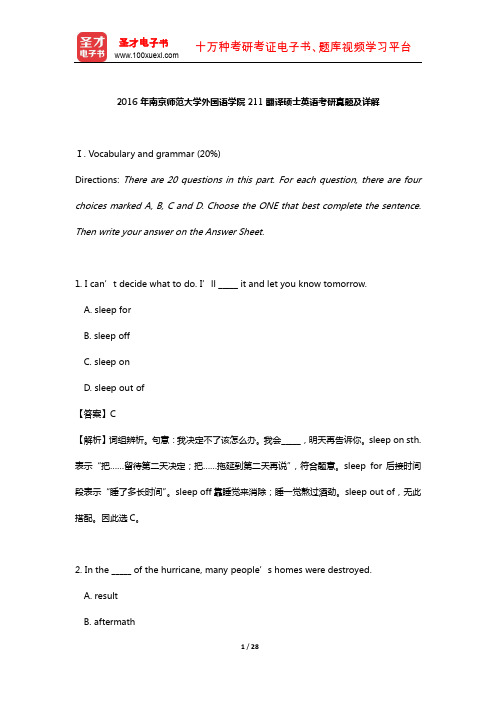
2016年南京师范大学外国语学院211翻译硕士英语考研真题及详解Ⅰ. Vocabulary and grammar (20%)Directions: There are 20 questions in this part. For each question, there are four choices marked A, B, C and D. Choose the ONE that best complete the sentence. Then write your answer on the Answer Sheet.1. I can’t decide what to do. I’ll _____ it and let you know tomorrow.A. sleep forB. sleep offC. sleep onD. sleep out of【答案】C【解析】词组辨析。
句意:我决定不了该怎么办。
我会_____,明天再告诉你。
sleep on sth.表示“把……留待第二天决定;把……拖延到第二天再说”,符合题意。
sleep for后接时间段表示“睡了多长时间”。
sleep off靠睡觉来消除;睡一觉熬过酒劲。
sleep out of,无此搭配。
因此选C。
2. In the _____ of the hurricane, many people’s homes were destroyed.A. resultB. aftermathC. consequenceD. upshot【答案】B【解析】词义辨析。
句意:飓风的后果是许多人的房屋被毁。
aftermath后果,搭配为in the aftermath of,符合题意。
result结果,搭配为as a result of。
consequence后果,搭配为in consequence of。
upshot表示“最后结果;结局”,前不加介词in。
南师大翻硕参考书目

南师大翻硕参考书目
1. 《翻译学概论》刘宓庆
2. 《翻译研究方法论》陈宇
3. 《翻译教学论》王秀芝
4. 《语用学研究与翻译教学》陈宇
5. 《文化翻译理论与实践》贺文华
6. 《汉英翻译技巧精讲》徐会敏
7. 《英汉翻译技能训练》顾秀萍
8. 《翻译学中的语言问题》赵丽英
9. 《汉语语法与英语翻译》王亚平
10. 《翻译实践与研究》张玉珍
11. 《翻译与跨文化交际》王秀芝
12. 《翻译心理学与翻译实践》张龙
13. 《翻译与本土化》王秀芝
14. 《汉语翻译英语实践教程》田胜彬
15. 《英汉翻译技巧及练习》徐凌峰
16. 《汉语翻译英语中的文化问题》刘幼琦
17. 《翻译学概要》陈晨
18. 《汉英翻译:基础与实践》李登科
19. 《外语翻译实用技巧》崔晓春
20. 《翻译与思维》王秀芝。
- 1 -。
2016年南京师范大学MTI经验

跨考独家整理最全翻硕考研知识资料库,您可以在这里查阅历年翻译硕士考研真题和知识点等内容,加入我们的翻硕考研交流群还可以获得翻硕学长免费答疑服务,帮你度过最艰难的考研年。
以下内容为跨考网整理,如您还需更多考研资料,可选择翻硕考研一对一咨询进行解答。
2016年南京师范大学MTI经验其实我写的内容也不能算是经验吧,就是和大家分享一下考研的历程。
大概说一下我的作息时间哈,早上六点起床,中午就是在图书馆休息半个小时,晚上就是图书馆闭馆的时候也就是九点半左右回宿舍,然后十一点左右就睡觉了。
下面我就从四个方面来说一下我是怎么复习的。
首先政治 67分政治用的书就是考研大纲,肖秀荣1000题,最后的八套卷和四套卷。
还有就是分析历年真题。
政治我大概是从九月份开始复习的,但是我发现九月开始复习的话我觉得有点来不及,因为知识点很多,光看大纲就是理解的不透彻。
所以我建议大家在复习政治的时候最好从暑假开始去看政治视频,每天看一点,积少成多。
这样的话对于知识点的理解就会容易点了。
然后九月就可以做做1000题了,1000题我只做了一遍,后来就懒得去做了。
但是我觉得做两遍1000题可能效果会有所不同吧。
每天有计划的去看大纲,做题目,考个六七十应该没问题的。
选择题考察的可能就会是知识点的细节,所以大家复习时候一定要弄懂细节,不要有所遗漏。
然后肖四的简答题一定要背,不一定要背的滚瓜烂熟但是一定把那些答题的点记住。
虽然肖四有时候会押中,但是好像我们今年就没有考到吧。
但是背了他的简答题后,考试中的简答题你可以有话说了。
嗯,政治差不多就是这些了。
其次是翻译硕士英语 79分其实这一门相对来说不算太难。
首先是20个选择题,然后2篇阅读理解,1篇问答题,最后是一篇作文。
复习这一门的话我就是做了各校的基础英语的真题和专四的选择题,专八的阅读和高口的问答题那本书。
今年第一篇阅读理解简直读不懂啊,可能是我水平有限。
然后第二篇难度一般吧,第三篇问答题就是可以直接在文章中找到答案的。
2016-2017南京大学外国语学院考研专业目录考试科目参考书复试线报录比真题及经验-新祥旭考研辅导

日语 或 264 德语③655 基础法语④967 法语语言文
全国法
学
语专业
统编教
复试科目:0903 中法文综合能力;0911 口试
材。
《普通
语言学
本专业为江 苏省重点学 科。初试合 格、参加复 试者,按 (3)(4) 两门课的总
教程》 分 排 名 。 考
索绪尔 生在第(4)
著,商 门 法 语 语 言
学相关 教材。
050207
西班牙 2
语语言
文学
01 西班
牙、拉
丁美洲
文学
①101 思想政治理论②261 英语 或 262 俄语 或 263 《现代
日语 或 264 德语 或 265 法语③659 基础西班牙语
西班牙
④991 西班牙、拉丁美洲文学
语》
(1-6
复试科目:0906 中西文综合能力;0911 口试
①101 思想政治理论②261 英语 或 262 俄语 或 264 近年出
德语 或 265 法语③657 基础日语④971 日语专业知
版的全
识综合
国日语
专业统
复试科目:0905 中日文综合能力;0911 口试
编教
材。日
文编写
的日本
文学
史、日
本文化
史、日
本历史
与社
会、日
语语言
初试合格、 参加复试 者,按(3) (4)两门课 的总分排 名。不接受 单独考试。
目。不接受 单独考试。
史》 (俄文 版)任 光宣等 编,北 京大学 出版 社; 《俄罗 斯文学 选集》 (俄文 版)张 建华等 编,外 语教学 与研究 出版 社。
050203 法语语 6 言文学 01 翻译 理论与 实践 02 法国 文学 03 法语 语言学
翻译硕士参考书目

2016英语翻译硕士(MTI)复习方法及参考书目<1>:英语翻译基础※词语翻译※:用本子多摘抄记录或打印装订多积累,多分类总结,多背多复习几遍,才能拿高分。
《最新汉英特色词汇词典》-中国日报网《中国日报网英语点津-LanguageTips》-Web/微博《经济学人-TheEconomist》《ZF工作报告》-(14年、15年)※英汉互译※:《十二天突破英汉翻译-笔译篇》-武峰《英汉翻译简明教程》-庄绎传《中式英语之鉴》-平卡姆《实用英汉翻译教程》-申雨平《非文学翻译理论与实践》-李长栓《翻译的艺术》-许渊冲《图解翻译学》-张伟平《名家评点翻译佳作》《散文佳作108篇》-乔萍等《英语笔译二级/三级实务》-卢敏/张春柏《冲击波-英语专业八级翻译》-张艳莉《英译中国现代散文选》-张培基先自己翻译书上的内容,然后拿自己的与原文对比,遇到好的表达或句子等摘抄下来积累,要定期复习,带着翻译技巧去练习。
翻译实际上翻的是两种语言的差异,比如:由于中文语言很简略,所以要注意分析中文句子中隐含的被动语态,翻译还是那句话要多看多模仿名家翻译,多练习,自己动手还是相当重要的,就拿一本三级或二级笔译实务使劲做,翻来覆去练,和人家翻译的找差距,找不足,慢慢的,自然而然你的水平就上去了,练好翻译是个长久功夫,慢慢来,急不得,每天要保持着翻译的感觉。
英语笔译总之给人的印象是措辞结构要正式些,书面化,不能很随意。
翻译的标准是信达雅,我觉得在考试那么紧张的环境下,雅就免提了,但必须要达到信。
说点题外话,我觉得翻译应该是件多优雅,多惬意的事情,你可以慢慢推敲,咬文嚼字,就好像古代的诗人写诗一样,翻译同样也是一种recreation,如果限时去翻译一篇散文,很难翻译好,所以我感觉老师改卷子也应该考虑到这点了,给大家的标准不会设得很高,大家就算觉得自己翻译像rubbish,也要硬着头皮写,不写肯定不会给你分的,每当这个时候我们要阿Q一点,我不会别人也不一定会,有必要这么安慰自己一下。
南京师范大学参考书目

参考书目(全日制专业学位)学院专业代码及名称初试参考书目复试参考书目文学院420103学科教学(语文)《语文新课程标准》;《语文课程与教学论新编》,张中原、徐林祥主编,江苏教育出版社,2007年版。
《语文教学技能全能训练新编》,徐林祥、张中原主编,江苏教育出版社2009年版。
公管院420102 学科教学(思政)《马克思主义基本原理概论》,高等教育出版社,2008年修定版。
《新编思想政治(品德)教学论》,谢树平等著,华东师范大学出版社,2006年。
法学院410100 法律硕士(非法学)无《法理学》,公丕祥主编,复旦大学出版社,2008年第二版;《法理学》,张文显主编,高等教育出版社、北京大学出版社,2007年第三版。
410200 法律硕士(法学)无同“法律硕士(非法学)”专业商学院460100 工商管理硕士无无教科院420101 教育管理《教育管理学》(第3版)陈孝彬主编,北京师范大学出版社(2008年)《教育政策法规的理论与实践》(第2版),张乐天主编,华东师范大学出版社(2009年)420114 现代教育技术《C程序设计》谭浩强主编,清华大学出版社最新版;《Web程序设计》(第2版)吉根林主编,电子工业出版社(2005年)《信息化教育概论》南国农主编,高等教育出版社(2004年)420115 小学教育《小学教学论》刘树仁,人民教育出版社(2003年版)。
《小学语文课程与教学论》江平主编,高等教育出版社(2004年版);中华人民共和国教育部全日制义务教育《语文课程标准(实验稿)》,北京师范大学出版社(2001年版)(如果新的语文课程标准出版,以新修订的为准)《小学数学教学研究》刘晓玫,首都师范大学出版社。
中华人民共和国教育部全日制义务教育《数学课程标准(实验稿)》,北京师范大学出版社(2001年版)。
《教育研究专题》郑金洲主编,华东师范大学出版社(2002年);《教师如何做质的研究》陈向明主编,教育科学出版社(2001年)。
翻译硕士 MTI 各校 参考书 报录比
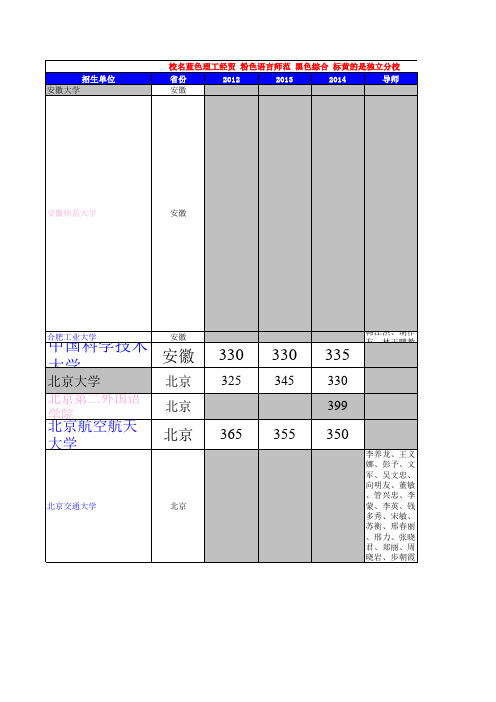
复试科目:1.英语笔译、2.英语口译;同等学力加试:高级阅读与写作、高级英语听说。
1-《实用翻译教程(修订版)》,刘季春主编,中山大学出版社。
2-《英汉翻译基础教程》,冯庆华、穆雷主编,高等教育出版社;
3-《英语口译教程》,仲伟合主编,高等教育出版社。
4-《高级英语》张汉熙,外语教学与研究出版社。
355
355
355
朱桃香、詹乔、赵友斌、赵君、程倩、王心洁、蒲若茜、李国庆、陈龙、李海辉、李知宇、宫齐、廖开洪、黄若妤、付永钢、施佳胜、王全智、朱湘军、梁瑞清、刘森林、段维军
360 360 370 中山大学 广东 广西大学 广西 调剂 广西民族大学 广西 调剂 广西师范大学 广西 调剂 贵州大学 贵州 调剂 贵州师范大学 贵州 调剂 夏尚立、胡晓 海南大学 海南 1-《高级 河北大学 河北 河北联合大学 河北 1-《高级英语》( 河北师范大学 河北 华北电力大学(保定) 河北 燕山大学 河北 河南大学 河南 1-《实用英汉翻译教程》申雨平等编(外语 河南科技大学 河南 河南师范大学 河南 解放军外国语学院 河南 杨明星,刘辰诞 李晶漪,杨黎 信阳师范学院 河南 郑州大学 河南 联合办学 东北林业大学 黑龙江 哈尔滨工程大学 黑龙江 调剂 360 360 355 哈尔滨工业大学 黑龙江 1-《英汉笔译全译实践教程》主编黄忠廉 哈尔滨理工大学 黑龙江 余承法 国防工业出版社
2016年南京师范大学翻译硕士英语真题试卷.doc
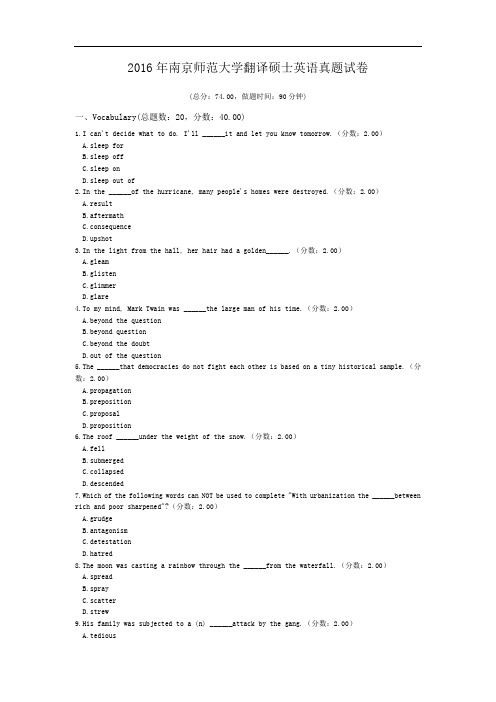
2016年南京师范大学翻译硕士英语真题试卷(总分:74.00,做题时间:90分钟)一、Vocabulary(总题数:20,分数:40.00)1.I can't decide what to do. I'll ______it and let you know tomorrow.(分数:2.00)A.sleep forB.sleep offC.sleep onD.sleep out of2.In the ______of the hurricane, many people's homes were destroyed.(分数:2.00)A.resultB.aftermathC.consequenceD.upshot3.In the light from the hall, her hair had a golden______.(分数:2.00)A.gleamB.glistenC.glimmerD.glare4.To my mind, Mark Twain was ______the large man of his time.(分数:2.00)A.beyond the questionB.beyond questionC.beyond the doubtD.out of the question5.The ______that democracies do not fight each other is based on a tiny historical sample.(分数:2.00)A.propagationB.prepositionC.proposalD.proposition6.The roof ______under the weight of the snow.(分数:2.00)A.fellB.submergedC.collapsedD.descended7.Which of the following words can NOT be used to complete "With urbanization the ______between rich and poor sharpened"?(分数:2.00)A.grudgeB.antagonismC.detestationD.hatred8.The moon was casting a rainbow through the ______from the waterfall.(分数:2.00)A.spreadB.sprayC.scatterD.strew9.His family was subjected to a (n) ______attack by the gang.(分数:2.00)A.tediousB.hideousC.evilD.notorious10.The country was on the ______of becoming prosperous and successful.(分数:2.00)A.brimB.rimC.edgeD.verge11.Which of the following sentences is INCORRECT?(分数:2.00)A.All his lectures are very interesting.B.Half their savings were gone.C.Many his friends came to the party.D.Both his sisters are nurses.12.Which of the following words can NOT be used to complete "We've seen the film______"?(分数:2.00)A.beforeB.recentlytelyD.yet13.______should not become a serious disadvantage in life and work.(分数:2.00)A.To be not tallB.Not being tallC.Being not tallD.Not to be tall14.They stood chatting together as easily and naturally as______.(分数:2.00)A.it could beB.could beC.it wasD.was15.The following are all correct responses to "Who told the news to the teacher?" EXCEPT______.(分数:2.00)A.Jim did thisB.Jim did soC.Jim did thatD.Jim did16.In his plays, Shakespeare ______his characters live through their language.(分数:2.00)A.would makeB.had madeC.has madeD.makes17.The square itself is five hundred yards wide, five times ______the size of St. Peter's in Rome.(分数:2.00)A./B.that ofC.which isD.of18.______dull he may be, he is certainly a very successful top executive.(分数:2.00)A.AlthoughB.WhateverC.AsD.However19.If only I ______play the guitar as well as you!(分数:2.00)A.wouldB.couldC.shouldD.might20.The party, ______I was the guest of honor, was extremely enjoyable.(分数:2.00)A.by whichB.for whichC.to whichD.at which二、Reading Comprehensio(总题数:3,分数:32.00)Yet the difference in tone and language must strike us, so soon as it is philosophy that speaks; that change should remind us that even if the function of religion and that of reason coincide, this function is performed in the two cases by very different organs. Religions are many, reason one. Religion consists of conscious ideas, hopes, enthusiasms, and objects of worship; it operates by grace and flourishes by prayer. Reason, on the other hand, is a mere principle or potential order, on which indeed we may come to reflect but which exists in us ideally only, without variation or stress of any kind. We conform or do not conform to it; it does not urge or chide us, not call for any emotions on our part other than those naturally aroused by the various objects which it unfolds in their true nature and proportion. Religion brings some order into life by weighting it with new materials. Reason adds to the natural materials only the perfect order which it introduces into them. Rationality is nothing but a form, an ideal constitution which experience may more or less embody. Religion is a part of experience itself, a mass of sentiments and ideas. The one is an inviolate principle, the other a changing and struggling force. And yet this struggling and changing force of religion seems to direct man toward something eternal. It seems to make for an ultimate harmony within the soul and for an ultimate harmony between the soul and all that the soul depends upon. Religion, in its intent, is a more conscious and direct pursuit of the Life of Reason than is society, science, or art, for these approach and fill out the ideal life tentatively and piecemeal, hardly regarding the goal or caring for the ultimate justification of the instinctive aims. Religion also has an instinctive and blind side and bubbles up in all manner of chance practices and intuitions; soon, however, it feels its way toward the heart of things, and from whatever quarter it may come, veers in the direction of the ultimate. Nevertheless, we must confess that this religious pursuit of the Life of Reason has been singularly abortive. Those within the pale of each religion may prevail upon themselves, to express satisfaction with its results, thanks to a fond partiality in reading the past and generous draughts of hope for the future; but any one regarding the various religions at once and comparing their achievements with what reason requires, must feel how terrible is the disappointment which they have one and all prepared for mankind. Their chief anxiety has been to offer imaginary remedies for mortal ills, some of which are incurable essentially, while others might have been really cured by well-directed effort. The Greek oracles, for instance, pretended to heal out natural ignorance, which has its appropriate though difficult cure, while the Christian vision of heaven pretended to be an antidote to our natural death — the inevitable correlate of birth and of a changing and conditioned existence. By methods of this sort little can be done for the real betterment of life. To confuse intelligence and dislocate sentiment by gratuitous fictions is a short-sighted way of pursuing happiness. Nature is soon avenged. An unhealthy exaltation and a one-sided morality have to be followed by regrettable reactions. When these come, the real rewards of life may seem vain to a relaxed vitality, and the very name of virtue may irritate young spirits untrained inand natural excellence. Thus religion too often debauches the morality it comes to sanction and impedes the science it ought to fulfill. What is the secret of this ineptitude? Why does religion, so near to rationality in its purpose, fall so short of it in its results? The answer is easy; religion pursues rationality through the imagination. When it explains events or assigns causes, it is an imaginative substitute for science. When it gives precepts, insinuates ideals, or remoulds aspiration, it is an imaginative substitute for wisdom —I mean for the deliberate and impartial pursuit of all good. The condition and the aims of life are both represented in religion poetically, but this poetry tends to arrogate to itself literal truth and moral authority, neither of which it possesses. Hence the depth and importance of religion becomes intelligible no less than its contradictions and practical disasters. Its object is the same as that of reason, but its method is to proceed by intuition and by unchecked poetical conceits.(分数:10.00)(1).As used in the passage, the author would define "wisdom" as______.(分数:2.00)A.the pursuit of rationality through imaginationB.an unemotional search for the truthC.a purposeful and unbiased quest for what is bestD.a short-sighted way of pursuing happiness(2).Which of the following statements is NOT TRUE?(分数:2.00)A.Religion seeks the truth through imagination, reason, in its search, utilizes the emotions.B.Religion has proved an ineffective tool in solving man's problems.C.Science seeks a piecemeal solution to man's questions.D.The functions of philosophy and reason are the same.(3).According to the author, science differs from religion in that______.(分数:2.00)A.it is unaware of ultimate goalsB.it is unimaginativeC.its findings are exact and finalD.it resembles society and art(4).The author states that religion differs from rationality in that______.(分数:2.00)A.it relies on intuition rather than reasoningB.it is not concerned with the ultimate justification of its instinctive aimsC.it has disappointed mankindD.it has inspired mankind(5).According to the author, the pursuit of religion has proved to be______.(分数:2.00)A.imaginativeB.a provider of hope for the futureC.a highly intellectual activityD.ineffectualIn some countries where racial prejudice is acute, violence has so come to be taken for granted as a means of solving differences, that it is not even questioned. There are countries where the white man imposes his rule by brute force; there are countries where the black man protests by setting fire to cities and by looting and pillaging. Important people on both sides, who would in other respects appear to be reasonable men, get up and calmly argue in favor of violence —as if it were a legitimate solution, like any other. What is really frightening, what really fills you with despair, is the realization that when it comes to the crunch, we have made no actual progress at all. We may wear collars and ties instead of war-paint, but our instincts remain basically unchanged. The whole of the recorded history of the human race, that tedious documentation of violence, has taught us absolutely nothing. We have still not learnt that violence never solves a problem but makes it more acute. The sheer horror, the bloodshed, the suffering mean nothing. No solution ever comes to light the morning after when we dismally contemplate the smoking ruins and wonder what hit us. The truly reasonable men who know where the solutions lieare finding it harder and harder to get a hearing. They are despised, mistrusted and even persecuted by their own kind because they advocate such apparently outrageous things as law enforcement. If half the energy that goes into violent acts were put to good use, if our efforts were directed at cleaning up the slums and ghettos, at improving living-standards and providing education and employment for all, we would have gone a long way to arriving at a solution. Our strength is sapped by having to mop up the mess that violence leaves in its wake. In a well-directed effort, it would not be impossible to fulfill the ideals of a stable social program. The benefits that can be derived from constructive solutions are everywhere apparent in the world around us. Genuine and lasting solutions are always possible, providing we work within the framework of the law. Before we can even begin to contemplate peaceful co-existence between the races, we must appreciate each other's problems. And to do this, we must learn about them: it is a simple exercise in communication, in exchanging information. "Talk, talk, talk," the advocates of violence say, "all you ever do is talk, and we are none the wiser." It's rather like the story of the famous barrister who painstakingly explained his case to the judge. After listening to a lengthy argument the judge complained that after all this talk, he was none the wiser. "Possible, my lord," the barrister replied, "none the wiser, but surely far better informed." Knowledge is the necessary prerequisite to wisdom: the knowledge that violence creates the evils it pretends to solve.(分数:10.00)(1).What is the best title for this passage?(分数:2.00)A.Advocating Violence.B.Violence Can Do Nothing to Diminish Race Prejudice.C.Important People on Both Sides See Violence As a Legitimate Solution.D.The Instincts of Human Race Are Thirsty for Violence.(2).Recorded history has taught us______.(分数:2.00)A.violence never solves anythingB.nothingC.the bloodshed means nothingD.everything(3).It can be inferred that truly reasonable men______.(分数:2.00)A.can't get a hearingB.are looked down uponC.are persecutedD.have difficulty in advocating law enforcement(4)." He was none the wiser" means______.(分数:2.00)A.he was not at all wise in listeningB.he was not at all wiser than nothing beforeC.he gains nothing after listeningD.he makes no sense of the argument(5).According the author the best way to solve race prejudice is______.(分数:2.00)w enforcementB.knowledgeC.nonviolenceD.mopping up the violent messA bilingual person is someone who speaks two languages. A person who speaks more than two languages is called "multilingual" (although the term "bilingualism" can be used for both situations). Multilingualism isn't unusual; in fact, it's the norm for most of the world's societies. It's possible for a person to know and use three, four, or even more languages fluently. People may become bilingual either by acquiring two languages at the same time in childhood or by learning a second language sometime after acquiring their first language. Many bilingual people grow up speaking two languages. Often in America such people are the children of immigrants; these childrengrow up speaking their parents' native language in their childhood home while speaking English at school. Many bilinguals, however, are not immigrants; it is not uncommon for people born in the U. S. to speak English at school or work and another language at home. Children can also become bilingual if their parents speak more than one language to them, or if some other significant person in their life (such as a grandparent or caretaker) speaks to them consistently in another language. Sometimes a child will grow up in a household in which each parent speaks a different language; in that case, the child may learn to speak to each parent in that parent's language. In short, a young child who is regularly exposed to two languages from an early age will most likely become a fluent native speaker of both languages. The exposure must involve interaction;a child growing up in an English-speaking household who is exposed to Spanish only through Spanish-language television won't become a Spanish-English bilingual, but a child who is regularly spoken to in both English and Spanish will. It is also possible to learn a second language sometime after early childhood, but the older you get, the harder it is to learn to speak a new language as well as a native speaker. Many linguists believe there is a "critical period" (lasting roughly from birth until puberty) during which a child can easily acquire any language that he or she is regularly exposed to. Under this view, the structure of the brain changes at puberty, and after that it becomes harder to learn a new language. This means that it is much easier to learn a second language during childhood than as an adult. In some countries, nearly everybody is bilingual or multilingual. In parts of India, for example, a small child usually knows several languages. In many European countries, children are encouraged to learn a second language —typically English. In fact, the U. S. is quite unusual among the countries of the world in that many of its citizens speak only English, and they are rarely encouraged to become fluent in any other language. There is no evidence to suggest that it's any harder for a child to acquire two languages than it is for the child to acquire one language. As long as people are regularly speaking with the child in both languages, the child will acquire them both easily. A child doesn't have to be exceptional or have any special language ability to become bilingual; as long as the child is exposed to two languages throughout early childhood, he or she will acquire them both. Some people worry that learning more than one language is bad for a child, but nothing could be further from the truth. In fact, there are a lot of advantages to knowing more than one language. First, many linguists feel that knowing a second language actually benefits a child's cognitive development. Second, if the child comes from a family that has recently immigrated to the U. S. , the family may speak a language other than English at home and may still have strong ties to their ethnic roots. In this case, being able to speak the language of the family's ethnic heritage may be important for the child's sense of cultural identity. To be unable to speak the family's language could make a child feel like an outsider within his or her own family; speaking the family's language gives the child a sense of identity and belonging. Third, in an increasingly global marketplace, it's an advantage for anyone to know more than one language — regardless of whether one's family is new to the U. S. And finally, for people of any age or profession, knowing a second language encourages cross-cultural awareness and understanding. Some people may wonder whether bilingualism in America threatens the English language. Well, English is in no danger of disappearing any time soon; it is firmly established both in America and in countries throughout the world. In fact, no language has ever held as strong a position in the world as English does today. Some people worry when they see Spanish showing up on billboards and pay phones, but in a neighborhood with a high Spanish-speaking population, it makes perfectly good sense for public information and instructions to be printed in both English and Spanish. This doesn't mean that the English language is in danger. The truth is that there will probably always be immigrants in the U. S. , coming from a wide variety of countries, who cannot speak English but whose grandchildren and great-grandchildren will end up being native English speakers. The reason for this is, again, the fact that it is much easier for children to learn another language than itis for adults. Adults who immigrate to the U. S. , especially later in life, may never really become fluent in English. It's not that they don't want to speak English; it's simply much more difficult for them to learn it well. Their children, however, will be able to pick up English easily from their friends and the society around them. These second-generation immigrants, the children of the adult immigrants, are likely to be bilingual, speaking their parents' language at home and English at school and in the English-speaking community. When they grow up and have children of their own, those children —the third generation —will most likely speak only English, both at home with their bilingual parents and in the English-speaking community. Thisthree-generation pattern has been repeating itself for many years, through wave after wave of immigrants. Many adults today who speak only English can remember grandparents andgreat-grandparents who spoke very little English, who instead spoke mostly Polish, Italian, German, or Swedish — the language of the country they grew up in. In sum, bilingualism isn't a danger either to the English language or to the bilingual speakers themselves. On the contrary, there are many advantages to bilingualism, both for the individual and for the society as a whole. English enjoys tremendous dominance in the U. S. and in the world. But if history is any indication, there will always be people in the U. S. who cannot speak English — and they will have grandchildren who do. Answer the following questions:(分数:12.00)(1).How can people be bilingual?(分数:2.00)填空项1:__________________(2).What is the importance of "interaction" in the process of being bilingual?(分数:2.00)填空项1:__________________(3).In what way are the Americans "quite unusual" (Paragraph 4)?(分数:2.00)填空项1:__________________(4).According to the text, is it harder for a child to acquire two languages than it is for him to acquire only one language? Why or why not?(分数:2.00)填空项1:__________________(5).Is it important for children of immigrants to learn their native language? Why or why not?(分数:2.00)填空项1:__________________(6).Why does the author believe that bilingualism in the U. S. will not threaten the English language?(分数:2.00)填空项1:__________________三、Writing(总题数:1,分数:2.00)21.It is said that "There is no remedy for love but to love more." Do you agree with this opinion? Write an essay of about 500 words to state your view. In the first part of your writing you should present your thesis statement, and in the second part you should support the thesis statement with details including any relevant examples from your own knowledge or experience. In the last part you should bring what you have written to a natural conclusion or a summary. You should supply an appropriate title for your essay. Marks will be awarded for content, organization, language and appropriacy. Failure to follow the above instructions may result in a loss of marks.(分数:2.00)__________________________________________________________________________________________。
盛世清北-南京师范大学英语翻译硕士笔译备考
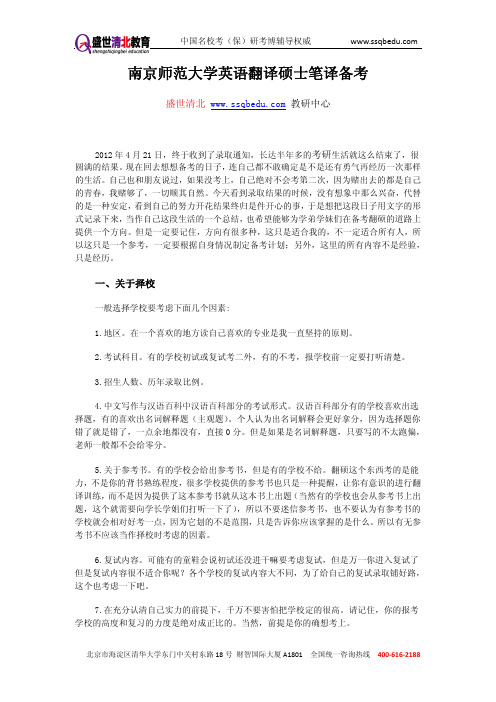
南京师范大学英语翻译硕士笔译备考盛世清北 教研中心2012年4月21日,终于收到了录取通知,长达半年多的考研生活就这么结束了,很圆满的结果。
现在回去想想备考的日子,连自己都不敢确定是不是还有勇气再经历一次那样的生活。
自己也和朋友说过,如果没考上,自己绝对不会考第二次,因为赌出去的都是自己的青春,我赌够了,一切顺其自然。
今天看到录取结果的时候,没有想象中那么兴奋,代替的是一种安定,看到自己的努力开花结果终归是件开心的事,于是想把这段日子用文字的形式记录下来,当作自己这段生活的一个总结,也希望能够为学弟学妹们在备考翻硕的道路上提供一个方向。
但是一定要记住,方向有很多种,这只是适合我的,不一定适合所有人,所以这只是一个参考,一定要根据自身情况制定备考计划;另外,这里的所有内容不是经验,只是经历。
一、关于择校一般选择学校要考虑下面几个因素:1.地区。
在一个喜欢的地方读自己喜欢的专业是我一直坚持的原则。
2.考试科目。
有的学校初试或复试考二外,有的不考,报学校前一定要打听清楚。
3.招生人数、历年录取比例。
4.中文写作与汉语百科中汉语百科部分的考试形式。
汉语百科部分有的学校喜欢出选择题,有的喜欢出名词解释题(主观题)。
个人认为出名词解释会更好拿分,因为选择题你错了就是错了,一点余地都没有,直接0分。
但是如果是名词解释题,只要写的不太跑偏,老师一般都不会给零分。
5.关于参考书。
有的学校会给出参考书,但是有的学校不给。
翻硕这个东西考的是能力,不是你的背书熟练程度,很多学校提供的参考书也只是一种提醒,让你有意识的进行翻译训练,而不是因为提供了这本参考书就从这本书上出题(当然有的学校也会从参考书上出题,这个就需要向学长学姐们打听一下了),所以不要迷信参考书,也不要认为有参考书的学校就会相对好考一点,因为它划的不是范围,只是告诉你应该掌握的是什么。
所以有无参考书不应该当作择校时考虑的因素。
6.复试内容。
可能有的童鞋会说初试还没进干嘛要考虑复试,但是万一你进入复试了但是复试内容很不适合你呢?各个学校的复试内容大不同,为了给自己的复试录取铺好路,这个也考虑一下吧。
- 1、下载文档前请自行甄别文档内容的完整性,平台不提供额外的编辑、内容补充、找答案等附加服务。
- 2、"仅部分预览"的文档,不可在线预览部分如存在完整性等问题,可反馈申请退款(可完整预览的文档不适用该条件!)。
- 3、如文档侵犯您的权益,请联系客服反馈,我们会尽快为您处理(人工客服工作时间:9:00-18:30)。
凯程考研,为学员服务,为学生引路!
第 1 页 共 1 页
2016年南师大翻译硕士参考书
想要报考南京师范大学翻译硕士的同学们注意了,2015年南京师范大学翻译硕士考研参考书目出来啦,想要报考的同学们还不赶快来看一看。
1-《英译中国现代散文选》张培基(三册中至少一册)非常经典,练基本功非它莫属。
2-《高级翻译理论与实践》叶子南汉译英的经典之作,体裁实用,读来作者亲授一般 3-《中高级口译口试词汇必备》新东方翻译的很多词汇都可以在这里找到,很实用。
4-《专八词汇》新东方试题中出现比较生僻的单词的话,读了这本词汇书基本你就认识了 5-《中国文化读本》叶朗朱良志翻译的体裁有时候和中国文化有关,作为译者应该了解中国文化;书本身也很好,图文并茂
6-《名作精译》青岛出版社都是名家翻译的,可以长长见识,看看翻译到底可以翻得多出彩 7-《英语专业八级人文知识》,冲击波,大连理工大学出版社2011或2012
8-《育明教育—全国高校翻译硕士真题集及答案详解》
以上就是2016年南京师范大学翻译硕士考研参考书目,希望有意向报考的南京师范的同学们好好收藏。
